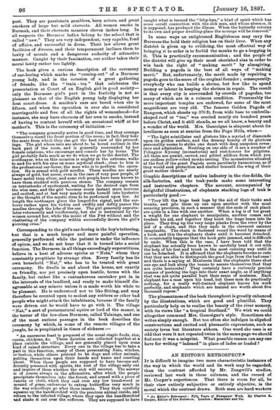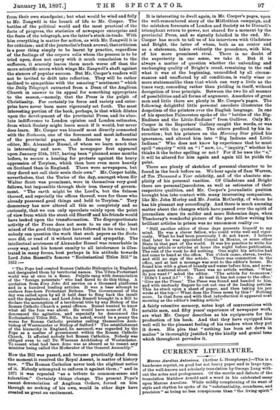AN EDITOR'S RETROSPECT.* IT is difficult to imagine two more
characteristic instances of the way in which the world and its work may be regarded, than the contrast afforded by Mr. Zangwill's studies, reviewed last week in these columns, and the record of Mr. Cooper's experiences. That there is room for all, be their view entirely subjective or entirely objective, is the moral whioh the contrast draws. Both men are hard workers
• An Rditor's Retrospect: Fifty rears of Newspaper Work. By Charles A. Cooper, Editor of the Scotsman. London : Macmillan and Co.
from their own standpoint ; but what would be wind and folly to Mr. Zangwill is the breath of life to Mr. Cooper. The battles of the political world and the most practical of the facts of progress, the statistics of newspaper enterprise and
the feats of the telegraph, are the latter's stock-in-trade. With him everything is matter for action, as with Mr. Zangwill it is for criticism; and if the journalist's frank avowal, that criticism is a poor thing simply to be learnt by practice, regardless of the feelings of the corpora roslia whom the process is to be tried upon, does not carry with it much consolation to the sufferers, it scarcely leaves them much worse off than the more scientific scorn which wings Mr. Zangwill's shaft against the sinners of popular success. But Mr. Cooper's readers will not be invited to drift into reflection. They will be rather inclined to sympathise with the amazing " sentiment " which the Daily Telegraph extracted from a Dean of the Anglican Church in answer to its appeal for something appropriate to the season,—namely, that the Press is the pulpit of
Christianity. For certainly its force and variety and enter- prise have never been more vigorously set forth. The most interesting portion of the book, perhaps, is that which dilates upon the development of the provincial Press, and its abso- lute indifference to London opinion and London estimates, from which Society might learn much if it would, but never
does learn. Mr. Cooper was himself most directly connected with the Scotsman, one of the foremost and most influential
of the provincial papers, made famous by a famous editor, Mr. Alexander Russel, of whom we learn much that is interesting and new. The newspaper first appeared upon January 25th, 1817, having been "planned some months before, to secure a hearing for protests against the heavy oppression of Toryism, which then bore even more heavily on Scotland than in England. There were newspapers, but they dared not call their souls their own." Mr. Cooper holds, nevertheless, that the Tories of the day, amongst whom Sir Walter Scott was prominent, were in themselves very good fellows, but impossible through their iron theory of govern- ment. "The earth might be the Lord's, but the fulness thereof, and especially the offices thereof, were for those who already possessed good things and held to Toryism." Tory democracy has now altered all this so completely and so .curiously, that we can only speculate vainly upon the point of view from which the stout old Sheriff and his friends would have looked upon the transformation. The disproportionate
activity of the Press does not seem to us one of the least mixed of the good things that have followed in its train ; but nobody can question the work that such papers as the Scots- man did, or read of it without interest and sympathy. The intellectual acuteness of Alexander Russel was remarkable in every way, and his honest enmity to all intolerance is illus- trated in many forms, best perhaps in his attitude towards Lord John Russell's famous "Ecclesiastical Titles Bill" in 1851 :— " The Pope had created Roman Catholic Bishoprics in England, and designated them by territorial names. The Ultra-Protestant world was at once in a flame. Pulpits rang with denunciation of the foreign potentate' who had dared to do this thing. A quotation from King John did service on a thousand platforms and in a hundred leading articles. It was a base attempt to enslave free-born Protestant Britons. The Government of the day was called upon by all it held dear to fling back the insult and the degradation; and Lord John Russell brought in a Bill to declare the assumption of a territorial title by any Bishop of the Roman Catholic Church a penal offence. Russel wanted to know what all the fuss was about. He would have none of it. He denounced the agitation, and especially he denounced the Ecclesiastical Titles Bill. Who, he asked, would be a penny the worse for Roman Catholic prelates calling themselves Arch- bishop of Westminster or Bishop of Salford ? The establishment of the hierarchy in England, he assumed, was regarded by the Pope as a matter of government within the Roman Catholic Church. It affected nobody but Roman Catholics. Nobody was obliged even to call Dr. Wiseman Archbishop of Westminster. To resent what had been done was as absurd as to resent any minister being called the Moderator of the General Assembly."
How the Bill was passed, and became practically dead from the moment it received the Royal Assent, is matter of history now. "The Roman Catholics never took the slightest notice of it. Nobody attempted to enforce it against them ; " and in 1871 it was repealed "as a tribute to common-sense and toleration." Certainly things change. The present Pope's
recent denunciation of Anglican Orders, forced on him through no seeking of his own, would in other days have crested as great an excitement.
It is interesting to dwell again, in Mr. Cooper's pages, upon the well-remembered story of the Midlothian campaign, and the mistaken forecasts of London and Society as to Disraeli's triumphant return to power, not shared for a moment by the provincial Press, and so signally falsified in the end. Mr. Cooper has much to tell us of his interviews with Gladstone and Bright, the latter of whom, both as an orator and as a statesman, takes evidently the precedence, with him,
of his more prominent rival. There is no doubt of the superiority in one sense, we take it. But it is always a matter of question whether the unbending and unchanging quality of Bright's creed, remaining to the end
what it was at the beginning, unmodified by all circum- stances and unaffected by all conditions, is really wiser or more statesmanlike than that which can vary a little as the times vary, conceding rather than yielding in itself, without derogation of true principle. Between the two lie all manner of possibilities and all forms of argument. Anecdotes of great men and little there are plenty in Mr. Cooper's pages. The following delightful little personal anecdote illustrates the despotism of the printers over the English language. In one of his speeches Palmerston spoke of the "battles of the Big- Endians and the Little-Endians " from Gulliver. Only Mr. Cooper in the Reporters' Gallery caught the words, or was
familiar with the quotation. The others profited by his in- struction; but his printers on the Morning Star pitied his ignorance, and altered him into "Big Indians and Little Indians." Who does not know by experience that he must spell "enquiry" with an " i " now, i.e., "inquiry," whether he thinks it the better spelling or not ? For if he uses the "e," it will be altered for him again and again till he yields the
point.
There are plenty of sketches of personal character to be
found in the book before us. We hear again of Sam Warren, of Ten Thousand a Year celebrity, and of the absolute sim- plicity of his personal vanities. Of Gladstone and Bright
there are pereonall:anecdotes, as well as estimates of their respective qualities, and Mr. Cooper's journalistic position brought him into contact with many interesting companions, like Mr. John Morley and Mr. Justin McCarthy, of whom he has his pleasant say accordingly. And there is much amusing matter about the changes which have passed over the spirit of journalism since its milder and more Bohemian days, when Thackeray's wonderful picture of the poor fellow writing his brilliant articles in prison was no uncommon reality :—
"Still another editor of those days presents himself to my mind. He was a clever fellow, who could write well and vigor- ously. What he had been previously I do not know. I believe that later he was appointed Consul in Mexico, or some other State in that part of the world. It was his practice to write his leading article or articles at home the night before publication. The rest of the week he did nothing. One night his articles had not come to hand at the office. Ten o'clock came, eleven, twelve, and still no sign of the article. There was commotion in the office, and at last a message was sent to the editor's house. He found him with a glass of brandy and water before him, and news- papers scattered about. There was no article written. What do you want ? ' asked the editor. 'The article for to-morrow.' Didn't I send it?' No. At least it has not come to the office.' Give me the Times.' The Times was found and handed to him, and with unsteady fingers he cut out one of its leading articles This he stuck upon a sheet of paper, and then taking his pen wrote at the top—' What does the Times mean by this ? ' Nothing more. In that form and with that introduction it appeared next morning as the editor's leading article."
A fairly retentive memory, notes kept of conversations with notable men, and fifty years' experience of newspaper work,
are what Mr. Cooper describes as his equipments for the production of his book. And that they have equipped him well will be the pleasant feeling of his readers when they put it down. His plea that "nothing has been set down in malice" is thoroughly justified by the kindly and genial tone which throughout pervades it.







































 Previous page
Previous page